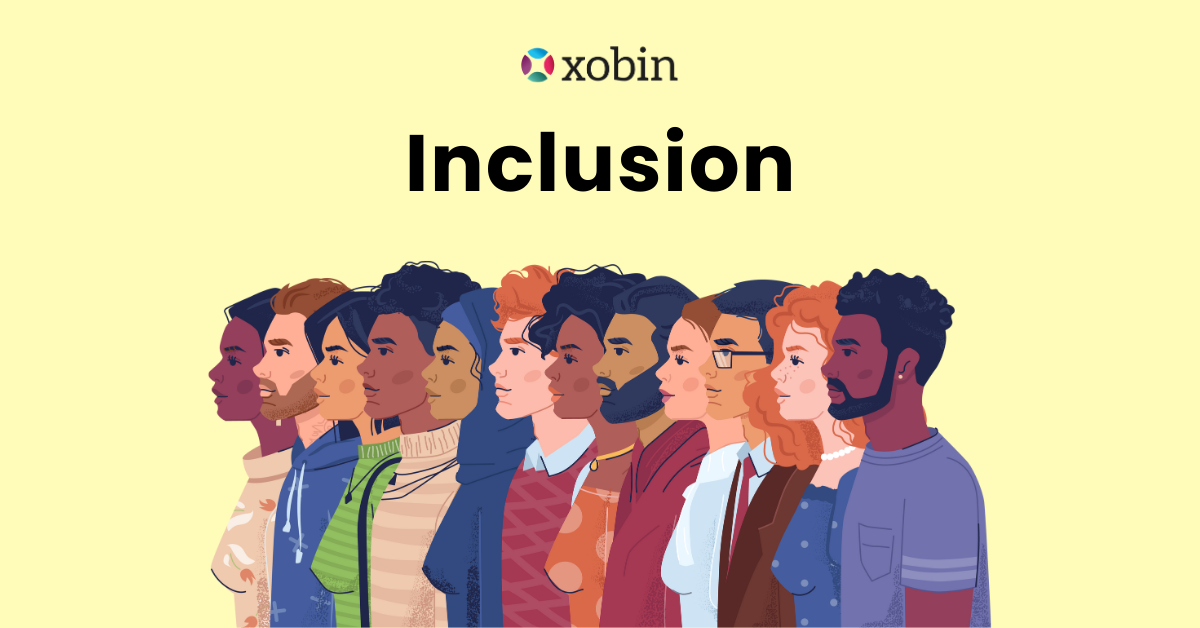XOBIPEDIA
HR Glossary

Table of Contents
People today are not just looking for a paycheck. They are looking for a place where they feel accepted, respected, and included. That shift in expectation is exactly where inclusion matters. Diversity may bring different individuals into an organization, but inclusion determines whether they feel empowered enough to stay, speak up, and contribute meaningfully.
For recruiters, leaders, and hiring teams, inclusion has shifted beyond a “nice-to-have.” Today, it plays a direct role in driving business outcomes overall.
TL;DR
- Inclusion creates workplaces where people feel respected, heard, and supported.
- It goes beyond representation to focus on everyday experiences and real participation.
- Inclusive cultures drive engagement, retention, innovation, and business outcomes.
- Fair, skill-based hiring is a foundational pillar of inclusion.
- Inclusion must be embedded across hiring, assessments, leadership, and culture. Also note that it should not be treated as a standalone initiative.
What Is Inclusion?
Inclusion is establishing an atmosphere in which all individuals can contribute to an organization or community. Most importantly, it guarantees that everyone has the same opportunities and resources to compete and participate in a free market of decision-making.
Unlike superficial policies, inclusion shows up in everyday interactions. For example,
- Are all the voices heard in meetings?
- Can hiring decisions be both fair and meritocratic?
- Have the employees ever had to hide who they are at work?
When the answer is yes, inclusion works.
An organization can hire an inclusive workforce, but if leadership is non-inclusive, processes aren’t fair, or there’s not psychological safety for people to participate, it may feel that way. Inclusion ensures that differences are not just present but actively respected and leveraged in decision-making, collaboration, and growth opportunities.
From an HR lens, inclusion spans the full employee lifecycle. It influences hiring, onboarding, performance reviews, promotions, and leadership development. Over time, it directly affects engagement, productivity, and employer brand, especially in competitive talent markets.

Inclusion vs Diversity: What’s the Difference?
Diversity and inclusion are two terms often used interchangeably. But it isn’t the same thing.
In the workplace, diversity is about representation. It raises questions like: Who is in the room? Are there team members who are women, or from other cultures or different age groups or people with other abilities?
Inclusion, on the other hand, is experiential. It wonders:
- Do those people get heard?
- Are they treated fairly?
- Are they at the table for real?
| Aspect | Diversity | Inclusion |
| Focus | Representation | Belonging & participation |
| Goal | Hiring varied talent | Enabling equal contribution |
| Measurement | Demographics | Engagement, fairness, voice |
| Impact | Visibility | Retention & performance |
Without Inclusion, diversity efforts often fail to deliver business value. Employees may join diverse organizations but leave due to bias, lack of growth, or exclusion from key conversations. Inclusive practices turn diversity into a competitive advantage.
Why Inclusion Matters in the Workplace
Improved Employee Engagement and Retention
Inclusive workplaces foster trust and psychological safety. Employees who feel respected are more likely to stay, contribute ideas, and advocate for the organization. Research consistently shows that inclusive cultures reduce voluntary attrition and burnout.
Better Decision-Making and Innovation
When people feel safe sharing perspectives, teams make better decisions. Inclusion encourages constructive dissent, diverse viewpoints, and creativity which is critical for innovation-driven organizations operating in complex markets.
Stronger Employer Brand and Compliance
Candidates increasingly evaluate employers on inclusion and fairness. Inclusive organizations attract broader talent pools and reduce risks related to discrimination, bias, and inequitable practices.
💡 Pro Tip: Inclusion is measurable. Track participation in discussions, fairness in assessments, promotion equity, and engagement scores and not just hiring ratios.
How Inclusion Impacts Hiring and Talent Assessment
Hiring is where inclusion begins or breaks.
Traditional hiring methods often rely on gut feelings. Unfortunately, this opens the door to unconscious bias. However, skills-based assessments level the playing field.
By using standardized tests, recruiters can evaluate candidates based on what truly matters: ability, potential, and job readiness. This approach supports inclusive hiring while improving hiring quality.
Moreover, assessments help identify hidden talent. Candidates from non-traditional backgrounds often perform exceptionally well when given fair evaluation methods.
Inclusion Across the Employee Lifecycle
Inclusion is not a one-time initiative. It must be embedded at every stage:
- Onboarding: Clear expectations, accessible resources, and welcoming practices
- Performance Management: Objective criteria, structured evaluations, and bias checks
- Learning & Development: Equal access to upskilling and leadership opportunities
- Career Progression: Transparent promotion criteria and fair succession planning
When inclusion is inconsistent, employees quickly notice gaps between intent and reality which undermines trust.
Measuring Inclusion: What HR Leaders Track
Unlike diversity metrics, Inclusion is measured through experience and outcomes. Common indicators include:
- Engagement and belonging survey scores
- Participation in meetings and decision-making
- Equity in performance ratings and promotions
- Attrition rates across demographic groups
Advanced HR teams combine qualitative feedback with data-driven insights to identify systemic barriers and course-correct proactively.
Inclusion Best Practices for HR and Leaders
To make inclusion real, HR teams should start with data.
- Measure hiring outcomes, assessment results, and employee feedback.
- Standardize hiring and promotion criteria because clear benchmarks reduce favoritism and bias.
- Train leaders and interviewers on inclusive behaviors. Awareness leads to better decisions.
- Use technology wisely like assessment tools, analytics, and structured processes make inclusion sustainable rather than symbolic.
How Xobin Supports Inclusion Through Skill-Based Assessments
At Xobin, inclusion is built into the hiring process.
Xobin’s talent assessment platform focuses on objective, skill-based evaluations. This reduces bias and ensures every candidate gets a fair chance. From pre-employment testing to employee skill assessments, Xobin helps organizations hire based on merit.
Additionally, Xobin supports scalable hiring. Whether you’re a startup or an enterprise, consistent assessments promote fairness across teams and locations.
By removing guesswork from hiring, Xobin empowers recruiters to build inclusive, high-performing teams with confidence.
Ready to reduce bias and hire purely based on skills? Book a personalized demo with Xobin today and see how data-driven assessments help you create inclusive, future-ready teams.
FAQs
1. What does inclusion mean in the workplace?
In HR, Inclusion means creating fair, respectful, and supportive workplaces where all employees feel valued, heard, and able to contribute fully.
2. How is Inclusion different from Diversity?
Diversity focuses on representation, while Inclusion focuses on experience, participation, and belonging within the organization.
3. Why is Inclusion important for business performance?
Inclusive organizations see higher engagement, better decision-making, stronger innovation, and lower attrition.
4. How can companies improve Inclusion?
By using structured hiring, unbiased assessments, inclusive leadership practices, transparent performance systems, and continuous feedback.
5. Can Inclusion be measured?
Yes. Through engagement surveys, equity metrics, participation data, and retention analysis across different employee groups.
6. Does Inclusion impact hiring outcomes?
Absolutely. Inclusive hiring processes expand talent pools, improve candidate trust, and lead to better long-term employee fit.
Recommended Content

Video Interviews can simplify your hiring
Don’t let a packed schedule be a hindrance in recruitment. Use structured interviews with the power of video to screen applicants. Understand the communication skills, motivation, and job skills using video interviews.

Pre-employment Testing: The Complete Guide
Move over from pen-paper based tests and manually checked assignments to pre-employment assessments. Democratize your organization hiring by screening for skills before you interview.

How can Employers adapt to Remote Hiring
With most jobs going remote, your best applicants could be in Melbourne or Miami. From remote screening and virtual interviews to remote onboarding, Learn the best practices to get started.


